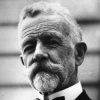Henry Cabot Lodge

Henry Cabot Lodge
Henry Cabot Lodgewas an American Republican Senator and historian from Massachusetts. Lodge received his PhD in history from Harvard. Lodge was a long-time friend and confidant of Theodore Roosevelt. Lodge had the roleof the first Senate Majority Leader. He is best known for his positions on foreign policy, especially his battle with President Woodrow Wilson in 1919 over the Treaty of Versailles. Lodge demanded Congressional control of declarations of war; Wilson refused and blocked Lodge's move to ratify the treaty...
NationalityAmerican
ProfessionPolitician
Date of Birth12 May 1850
CountryUnited States of America
If that for which the Spanish Empire has stood since the days of Charles V is right, then everything for which the United States stands and has always stood is wrong.
Look at the United States today. We have made mistakes in the past. We have had shortcomings. We shall make mistakes in the future and fall short of our own best hopes.
Contrast the United States with any country on the face of the earth today and ask yourself whether the situation of the United States is not the best to be found.
Standing, as I believe the United States stands for humanity and civilization, we should exercise every influence of our great country to put a stop to that war which is now raging in Cuba and give to that island once more peace, liberty, and independence.
The independence of the United States is not only more precious to ourselves but to the world than any single possession.
The United States is the world's best hope, but if you fetter her in the interests and quarrels of other nations, if you tangle her in the intrigues of Europe, you will destroy her power for good and endanger her very existence.
As you begin your tour of the United States, you may as well know that one American national trait which irritates many Americans and must be convenient for our critics is that we relentlessly advertise our imperfections.
Are ideals confined to this deformed experiment upon a noble purpose, tainted, as it is, with bargains and tied to a peace treaty which might have been disposed of long ago to the great benefit of the world if it had not been compelled to carry this rider on its back?
She has great problems of her own to solve, very grim and perilous problems, and a right solution, if we can attain to it, would largely benefit mankind.
But it is well to remember that we are dealing with nations every one of which has a direct individual interest to serve, and there is grave danger in an unshared idealism.
We should never suffer Cuba to pass from the hands of Spain to any other European power.
Membership of the United Nations gives every member the right to make a fool of himself, and that is a right of which the Soviet Union in this case has taken full advantage.
It has been well said that a hungry man is more interested in four sandwiches than four freedoms.
The fact that the talk may be boring or turgid or uninspiring should not cause us to forget the fact that it is preferable to war.